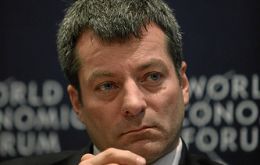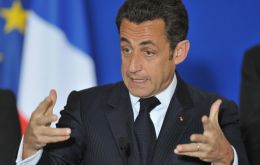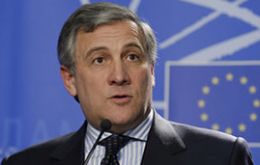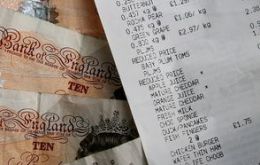MercoPress. South Atlantic News Agency
Tag: Europe
-
Saturday, June 16th 2012 - 03:03 UTC
“Who cares what an American official can think about the situation in Spain?”

Economics Nobel prize (2011) Thomas Sargent admitted feeling “ashamed” when some officials from the US government make recommendations to Europe, Spain and other countries on what policies they should adopt to climb out of the current crisis.
-
Friday, June 15th 2012 - 19:20 UTC
Modest gains in world markets waiting for the Greece’s Sunday election

US stock were modestly higher as optimism over a possible coordinated action by major world central banks if Sunday's Greek election causes financial turmoil was tempered by a weak reading on domestic manufacturing.
-
Thursday, June 7th 2012 - 20:19 UTC
Transparency warns about close links between business and governments leading to corruption in Europe

Anti-corruption group Transparency International warned in a new report released Thursday that the close relationship between business and government has enabled corruption and undermined economic stability in Europe.
-
Wednesday, March 21st 2012 - 06:57 UTC
Schmallenberg disease outbreak in Europe: Uruguay bans import of genetic material

Uruguay’s Ministry of Agriculture, Livestock and Fisheries has imposed a transitory ban on all genetic material imports from Europe following the outbreak of the disease Schmallenberg which attacks bovines, sheep, goats and buffalos.
-
Friday, February 3rd 2012 - 19:00 UTC
China has neither the ability or the intention to ‘buy Europe’ says Wen Jibao

China's Premier Wen Jiabao said on Friday the Asian giant had neither the ability nor the intention to “buy Europe”, amid concerns over growing Chinese investment in debt-stricken Euro zone economies.
-
Monday, January 2nd 2012 - 21:48 UTC
Merkel and Sarkozy prepare for yet another round of Euro-rescue talks

German Chancellor Angela Merkel and French President Nicholas Sarkozy have said they will meet next week to discuss the Euro zone debt crisis. Their first meeting of 2012 comes after all EU countries except the UK agreed to work together on a new treaty to stabilise the Euro zone.
-
Tuesday, December 13th 2011 - 06:14 UTC
Euro zone deal had to be supported by the ECB in its first test

European summit deal to strengthen budget discipline in the Euro zone failed to restore financial market confidence on Monday, forcing the European Central Bank to step in again gingerly.
-
Tuesday, November 22nd 2011 - 17:30 UTC
EU/Latinamerica address bilateral relations and the growing influence of China

European and Latinamerican leaders agreed in Brussels that the two continents should continue to strengthen links in spite of the serious financial and economic situation facing the European Union.
-
Monday, November 21st 2011 - 04:16 UTC
EU members settle for a budget increase of 2%; UK hails it as an ‘excellent deal’

The European Union has been forced to accept a 2% rise in its budget next year, much less than the increase it wanted of around 5%.
-
Saturday, October 1st 2011 - 05:36 UTC
UK worst place to live in Europe for quality of life, says uSwitch.com

The UK is now the worst place to live in Europe for quality of life and overall wellbeing, according to research by comparison site uSwitch.com. The high cost of living and work-driven culture means that Britain now sits at the bottom of a Quality of Life index. Ireland doesn’t come far behind in second place.
